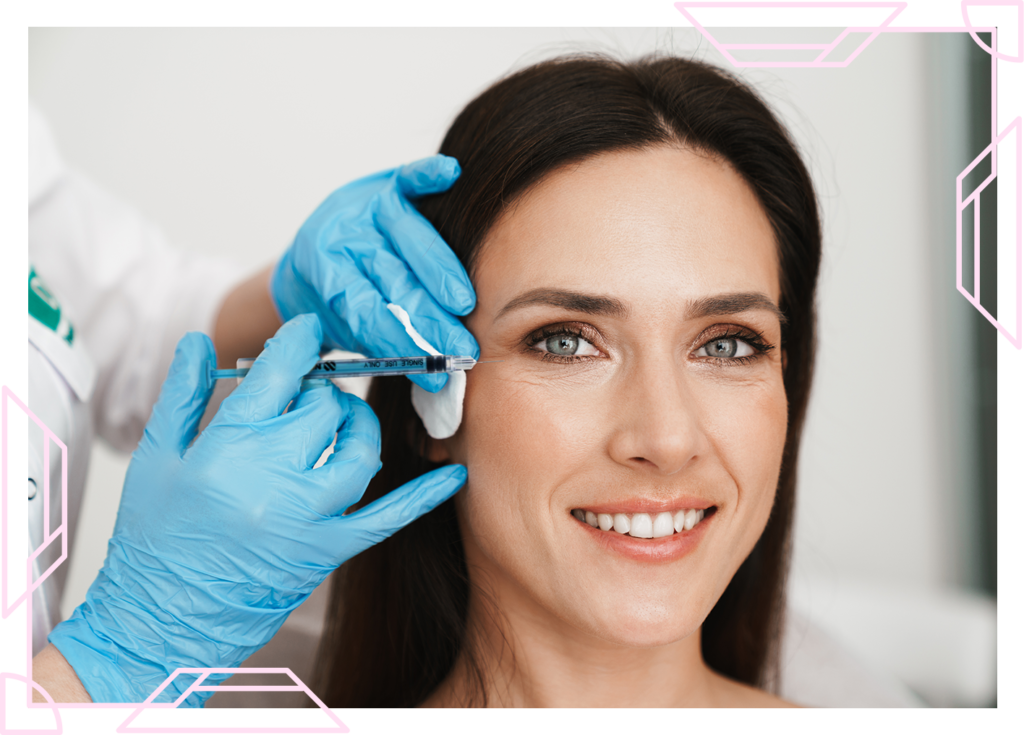
ANTI-WRINKLE INJECTIONS
In basic terms, the mechanism behind anti-wrinkle injections involves the interruption of chemical signals sent by the brain to the muscle, instructing it to tense or contract.
In other words, anti-wrinkle injections act as temporary muscle relaxants, resulting in a softened and diminished appearance of lines, leading to a tighter and smoother look.
Anti-wrinkle injections can be utilised both as a preventive measure, halting the formation of future lines, and as a means to minimise existing ones.
Anti-wrinkle treatments are considered suitable and safe for anyone over 18 years of age who is looking to reverse or prevent lines and wrinkles. However, it’s important to note that these treatments are contraindicated for pregnant or breastfeeding women, ensuring their well-being and the health of their child.
The effects of anti-wrinkle injections are not instant, they typically begin to take effect within 3-5 days, reaching the full results in 2 weeks. It’s normal to experience some initial redness and swelling following the treatment, but these temporary side effects usually subside within 30 minutes. As with any type of injection, there is a possibility of bruising, which should be considered as a common side effect.
The duration of results can vary from person to person, but typically, the effects of the treatment last around 3 to 4 months. To ensure ongoing optimal results, it is recommended to schedule a treatment every 3 to 4 months. This regular maintenance helps sustain the desired outcome and supports long-term satisfaction.
Like any injection, there’s a small sting when the needle pierces the skin but this sensation only lasts a few seconds and not too intense. It will be over before you know it!
Pre-Procedure Instructions for Anti-wrinkle injections:
- Share your medical history: Inform your healthcare provider about any medical conditions, allergies, or previous cosmetic procedures you've had. This information will help ensure your safety during the treatment.
- Stay hydrated: Drink plenty of water before your appointment to keep your skin hydrated, which can aid in the injection process.
- Avoid blood-thinning medications: Certain medications, supplements, and herbal remedies can increase the risk of bruising. Consult with your doctor about any blood-thinning medications you may be taking and follow their advice on whether to stop or continue them before the procedure.
- Avoid alcohol: Refrain from consuming alcohol for at least 24 hours before the procedure. Alcohol can increase the risk of bleeding and bruising.
- Don’t go hungry: It is advisable to have a meal prior to your appointment. This step is crucial in maintaining stable blood sugar levels, reducing the likelihood of feeling lightheaded or dizzy during the procedure.
After-Care Instructions for Anti-Wrinkle Injections:
- Keep your head elevated and avoid lying flat for approximately four hours after the procedure. This helps prevent the migration of the anti-wrinkle product into unintended areas.
- Wait for two weeks after anti-wrinkle injections before undergoing facials or invasive dermal treatments like microdermabrasion, skin needling, or dermal rolling. This allows the injected area to settle and reduces the risk of complications. Following this guideline ensures the effectiveness of your treatment and minimises potential adverse effects.
- Avoid touching or massaging the treated area. Refrain from touching, rubbing, or massaging the injected area for at least 24 hours. This will help prevent the anti-wrinkle product from spreading to unintended areas.
- Avoid intense physical activity, hot baths, saunas and drinking alcohol. For the first 24 hours after the treatment, avoid strenuous exercise or activities that may increase blood flow to the treated area. This can help minimise the risk of bruising or swelling.



